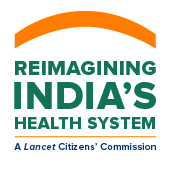In Conversation: Anuska Kalita, Visiting Scientist and India Health System Specialist at the Harvard T.H. Chan School of Public Health
September 12, 2022

Over the last 16 years, I have worked in the health sector in a variety of roles, including research, implementation, policy, and grant making. In fact, I have been fortunate to work with several of the Commissioners here across a range of these roles.
I worked on health systems and primary health during my first job at ICICI Foundation, where I was a part of conceptualizing and managing research on the impact of community health worker (CHW) programs on key health outcomes. Our findings contributed to the state-level scale-up of CHW programs and the national government’s ASHA Program design. Then, when I was at the World Bank, working on health research and private sector innovations for health across South Asia allowed me to engage with health systems in other low- and middle-income countries. I got the opportunity to draw on my experience working in a healthcare delivery organization to contribute to India’s National Health Policy (2017) by participating in the government’s Primary Healthcare Task Force. Being a part of the health systems work at the Gates Foundation further deepened my learnings and interest in this area.
Over the last five years at Harvard, as a Visiting Scientist and India Health Systems Specialist, as well as through my doctoral studies, I have focused on health systems research toward evidence-based policy reforms. Additionally, I have been able to contribute to initiatives to advance systems thinking by coordinating the Flagship Course on Health System Strengthening and Sustainable Financing offered by Harvard and other collaborators for senior policy leaders, and by designing and teaching a Course on Health System Assessment for mid-career researchers and practitioners in India.
At the Lancet Commission, I am involved in a few different roles. I am a part of the team working with the co-chairs on the Commission’s final report. Additionally, I am a part of a qualitative research study on understanding the barriers and facilitators of achieving UHC in India through interviews with health policy experts. To the best of our knowledge, this is the first such study of its kind, and I am really excited about it!
I am also involved in a large-scale household survey the Commission is undertaking across India.
To me, the main challenge in India is the lack of a “systems approach” in designing health reforms for UHC. Historically, health reforms in India have mostly been vertical and disease-focused. Though these have tried to address health system challenges, policies have focused on narrow areas like increasing physical access to health facilities (instead of, say, re-designing the organization of health delivery); or increasing hospital-based insurance (instead of thinking of financial risk protection more comprehensively). We need to move beyond this piecemeal, vertical approach. To achieve UHC, we need to use multiple policy levers of financing, organization, purchasing, and provider payments. Importantly, we must design solutions with high-value care as the goal, keeping in mind our mixed health system with interconnected public and private sectors.
I hope the Commission will successfully bring about a transformational shift toward health systems thinking in India. The Commission has managed to convene a diverse set of individuals representing heterogeneous aspects of India’s health system – individuals from both the public and private sectors, from academia, civil society, and health movements, not to mention different systems of medicine and digital technologies. This in itself is rare. I think it is an incredible opportunity to initiate a more comprehensive “health systems” approach to UHC reforms for the country.
